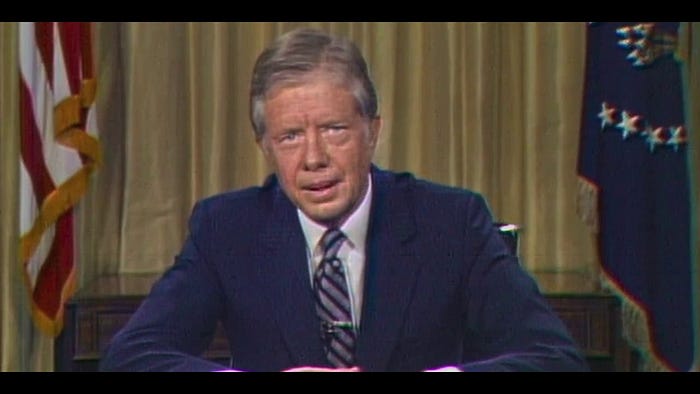OTD in History… July 15, 1979, President Jimmy Carter delivers the Malaise Speech
By Bonnie K. Goodman, BA, MLIS

On this day in history July 15, 1979, President Jimmy Carter delivered an address from the White House to the nation on “Energy and National Goals” focusing on the energy and oil crisis, Carter, however, indicated Americans are suffering a “crisis of confidence,” and the speech later became known as “The Malaise Speech.” In 1973, OPEC’s (Organization of Petroleum Exporting Countries) in the Middle East cut oil production creating a shortage of oil and gasoline in the United States, the country was also suffering from a recession and rising inflation. Carter believed the problem was bigger than the economy and emphasized America’s “crisis in confidence” in his address before discussing energy policy and possible solutions including alternative energy sources.
After a Camp David meeting with “business, labor, educational, political and religious leaders,” Carter concluded the real problem was Americans’ lack of “moral and spiritual confidence,” and materialism and the country were no longer the “world’s leaders” in “progress.” Carter also believed that politics was “fundamental threat to American democracy.” One particular line in the speech stands out, President Carter expressed, “The threat is nearly invisible in ordinary ways. It is a crisis of confidence. It is a crisis that strikes at the very heart and soul and spirit of our national will. We can see this crisis in the growing doubt about the meaning of our own lives and in the loss of a unity of purpose for our nation.” Although Carter never mentioned the word malaise, that line led the speech to be known as the “Malaise Speech.” Carter concluded in the nation finds their “common purpose” and restores “American values” then “Energy will be the immediate test of our ability to unite this Nation, and it can also be the standard around which we rally. On the battlefield of energy, we can win for our Nation a new confidence, and we can seize control again of our common destiny.”
The public responded positively to Carter’s speech but within a few days, he fired a number of members of his cabinet including his Secretary of Energy, the crisis of confidence turned into a lack of confidence in Carter’s administration by the American public. Historian Kevin Mattson argues in his book “What the Heck Are You Up To, Mr. President?”: Jimmy Carter, America’s “malaise,” and the Speech That Should Have Changed the Country, “Jimmy Carter had grown increasingly convinced that Americans had to face up to the energy crisis, but they only could do this if they faced up to the crisis in their own values. He tried to push the energy crisis on to a kind of moral and civic plane, and the speech was used to unify around a sense of civic sacrifice.”
To solve the energy crisis, Carter looked to “deregulate the price of domestic oil” adding a windfall profits tax, and creating “synthetic fuels.” In less than a year later, Congress passed “The Energy Security Act” and created the Synthetic Fuels Corporation. Historians Diane and Scott Kaufman call the bill, the “most sweeping energy legislation in the nation’s history.” Carter’s policies cut American energy consumption by 10 percent and the use of foreign oil by half by 1983. In an election year, Carter’s success was not enough to save his presidency, Republican Ronald Reagan capitalized on Carter’s negativity, and his conservative ideology appealed to the voters in its plan to reduce the “bloated government bureaucracy” Carter found central to the nation’s crisis.
SOURCES AND READ MORE
Kaufman, Diane, and Scott Kaufman. Historical Dictionary of the Carter Era. Lanham : The Scarecrow Press, Inc., 2013.
Mattson, Kevin. “What the Heck Are You Up To, Mr. President?”: Jimmy Carter, America’s “malaise,” and the Speech That Should Have Changed the Country. Bloomsbury: New York, 2009.
Bonnie K. Goodman has a BA and MLIS from McGill University and has done graduate work in religion at Concordia University. She is a journalist, librarian, historian & editor, and a former Features Editor at the History News Network & reporter at Examiner.com where she covered politics, universities, religion and news. She has a dozen years experience in education & political journalism.
